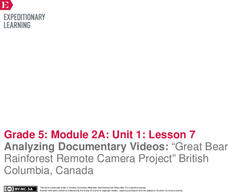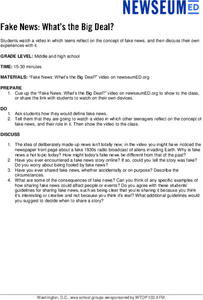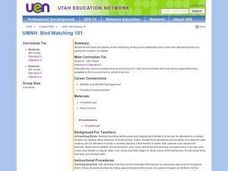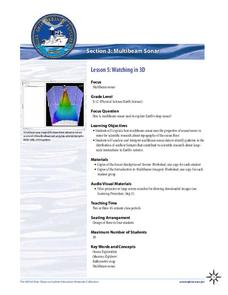Middle Tennessee State University
The Declaration of Independence: Its Legacy and Ideas in Today’s World
How is it possible that such an old document still triggers modern discussions? Teach scholars why the Declaration of Independence is still so important today using an informative resource. They watch various educational videos, work in...
EngageNY
End of Unit Assessment: Tracing and Evaluating Arguments
Give water the attention it deserves. Scholars watch Corporations Need to Pay More Attention to Water and respond to questions as part of their end of the unit assessment. They then complete the assessment by reading and responding to...
Greater Good Science Center
See The Good Challenge
Scientists study all sorts of things. For example, studies show that it feels good to feel grateful. Feeling grateful also contributes to physical health and strengthen relationships. In the second lesson about gratitude, class members...
EngageNY
Researching Information about Overfishing
Imagine a world without Nemo and Dory. Using the resource, pupils engage in a jigsaw activity, working in triads to research information about overfishing. They watch a video about overfishing, complete a graphic organizer, read relevant...
EngageNY
Presenting a Research-Based Claim: Effective Speaking Techniques
Take note. Scholars receive their claim drafts back to revise and write their claims and three pieces of evidence on notecards. They save the notecards to use when the verbally present their claims to the class. At the end, individuals...
EngageNY
Analyzing Documentary Videos: “Great Bear Rainforest Remote Camera Project” British Columbia, Canada
Lights, camera, action! Viewers discuss a video about the Great Bear Rainforest Remote Camera Project. As they watch, they find the gist, determine the meaning of unknown words, and analyze the features of a documentary as an...
Health Smart Virginia
Be Smart with Smartphones (and Screens)
Would you rather have a broken phone or a broken bone? This very engaging question launches a discussion about the smart use of smartphones and screens. Young scholars watch a series of videos, complete worksheets, and engage in...
PBS
Curious George: Five Senses
Curious scholars make like Curious George and use their five senses to identify mystery objects. After a brief discussion, learners watch an engaging Curious George video in preparation for an activity. Scholars visit three tables that...
Newseum
Fake News — What's the Big Deal?
In a time of fake news and alternative facts, young people must have the ability to identify it and its role. Scholars watch a video of teens reflecting on the concept of fake news and the impact of sharing fake news stories. They then...
Anti-Defamation League
On-Screen Diversity: Why Visibility in Media Matters
Characters play a significant role in why we like certain shows and movies but are the characters we watch representing the diverse society in which we live? Scholars examine this question through thoughtful discussion about popular...
Anti-Defamation League
Implicit Bias
Everyone has biases, both explicit—ones we are aware of—and implicit—ones we are unaware of. High schoolers learn the differences between explicit and implicit bias in a short activity where pupils watch a short video, read articles...
Curated OER
Stream Watch
Students discuss why it is important to take care of streams, what is non-point source and point source pollution, what are some causes of pollution in streams, and what can we do to prevent some of these causes of pollution? They steam...
Curated OER
The Search for Identity: "Their Eyes Were Watching God"
Students read the novel "Their Eyes Were Watching God". While reading the novel, they identify and discuss the figurative language used and use a passage of interest to them and analyze it in a written paper. They also discuss events...
Curated OER
Jack and the Beanstalk: Plant a Bean and Watch It Grow
Students plant bean seeds, watch them grow, and measure them with non-standard objects. They describe the bean's growth in a journal and record the growth on a calendar.
Curated OER
Bird Watching 101
Fourth graders examine the basics of bird watching, finding and interpreting bird clues and attracting birds to a particular location or habitat. They go on a birding hike after a lecture on what to look and listen for in the woods.
Curated OER
Let's Watch a Story
Fourth graders watch a silent movie and identify the elements of a story. They complete a worksheet attached to the lesson and discuss their answers.
Curated OER
Spider Watching
Spiders are creepy, crawly - and interesting! Young entomologists learn about parts of a spider's body, their habitats, ways spiders catch their prey, and what they most like to eat. Some excellent art activities are included in the plan...
Curated OER
Watch the Road Signs
What makes a good speaker? Upper elementary learners practice oral fluency by working with a partner to read nonfiction books. While reading, they practice using correct tone of voice, making eye contact, and speaking clearly.
Curated OER
Rapa River Watch
Assess the risk of introducing a non-native species of snail to four different estuaries. Lab groups conduct research as habitat evaluation and present their conclusions to the class. The resource has a comprehensive booklet containing...
NOAA
Watching in 3D
Bring the ocean floor to life! Earth science scholars discover the process of deep sea mapping in the third installment in a series of five lessons about ocean exploration. The teacher's guide includes helpful resources, worksheets, and...
Curated OER
Get to Know Birds
Young scholars observe animals in their natural habitats. In this bird identification lesson, students observe birds by watching and listening and report on the sightings they made. Young scholars also document bird signs such as...
Curated OER
Wanted: Invasive Species
Students create a WANTED poster about an invasive species to an ecosystem. In this invasive species lesson plan, students watch a video and research an invasive species and create the WANTED poster about it.
Curated OER
Cloud Watching
Pupils analyze art as a cloud pattern activity. In this cloud and art instructional activity, students view April Gornik's painting The Back of the Storm and make connections between science and art. Pupils observe cloud patterns for one...
Curated OER
History: I'm Watching You 24/7
Students examine the growth of authoritarian societies. Focusing on North Korea, they watch video clips looking for examples of totalitarianism and identify the problems there. They write letters to the editors of local newspapers...

























